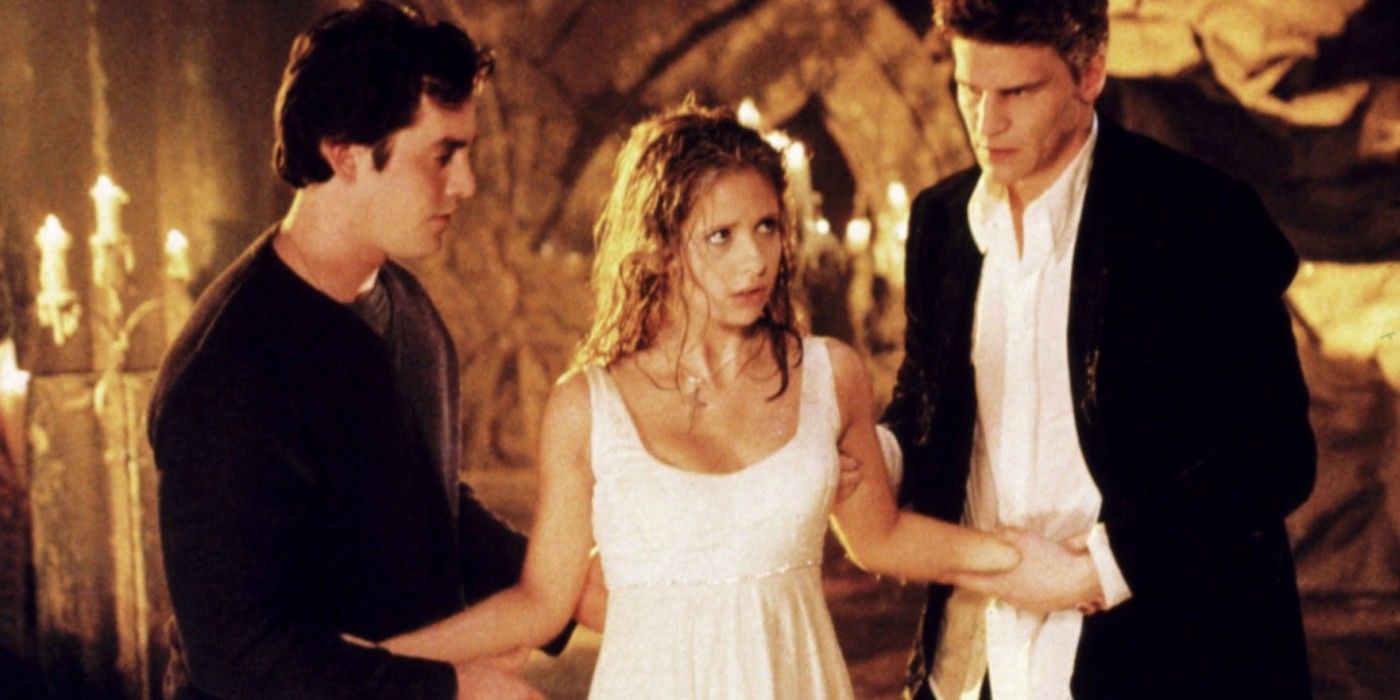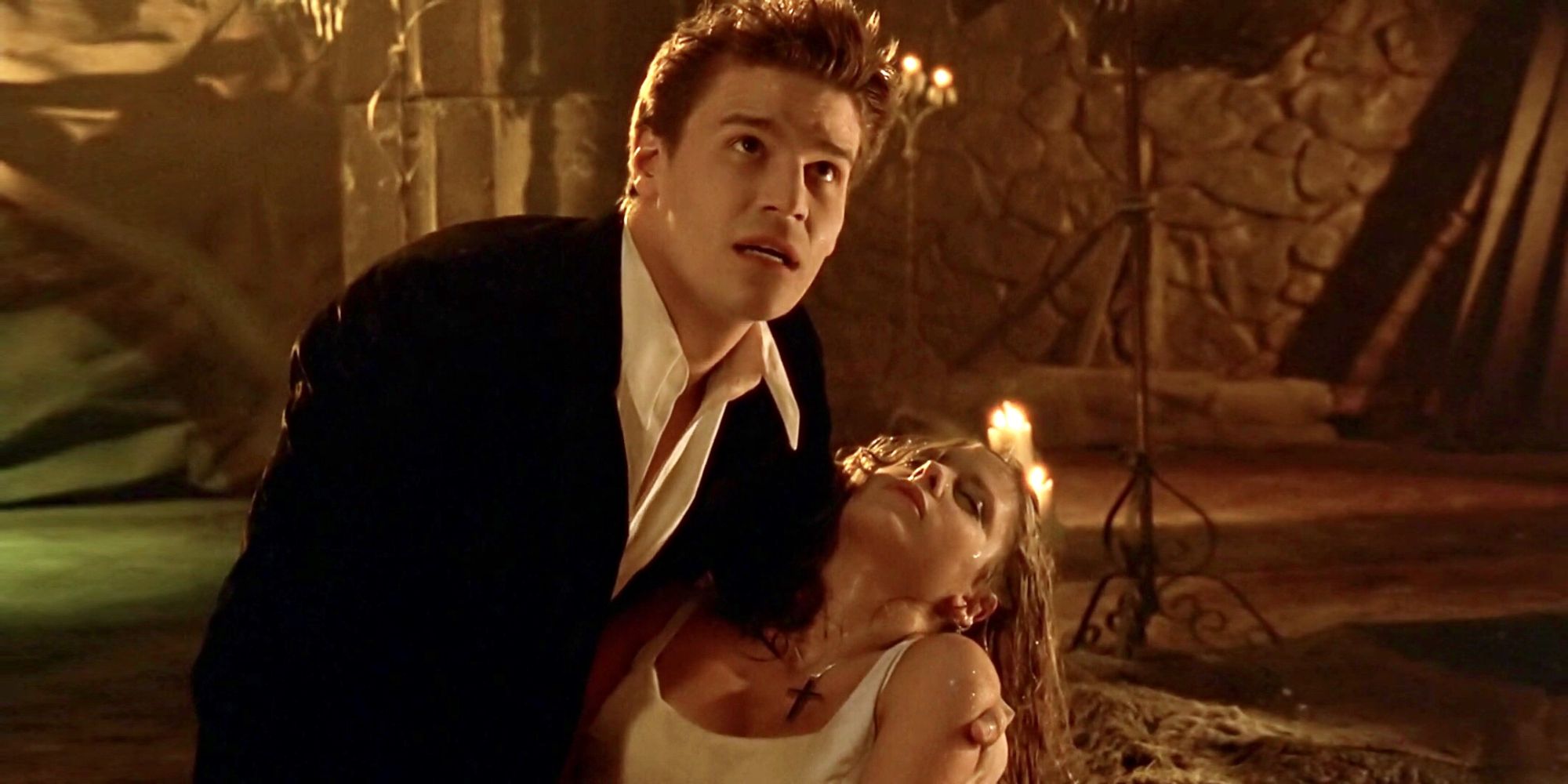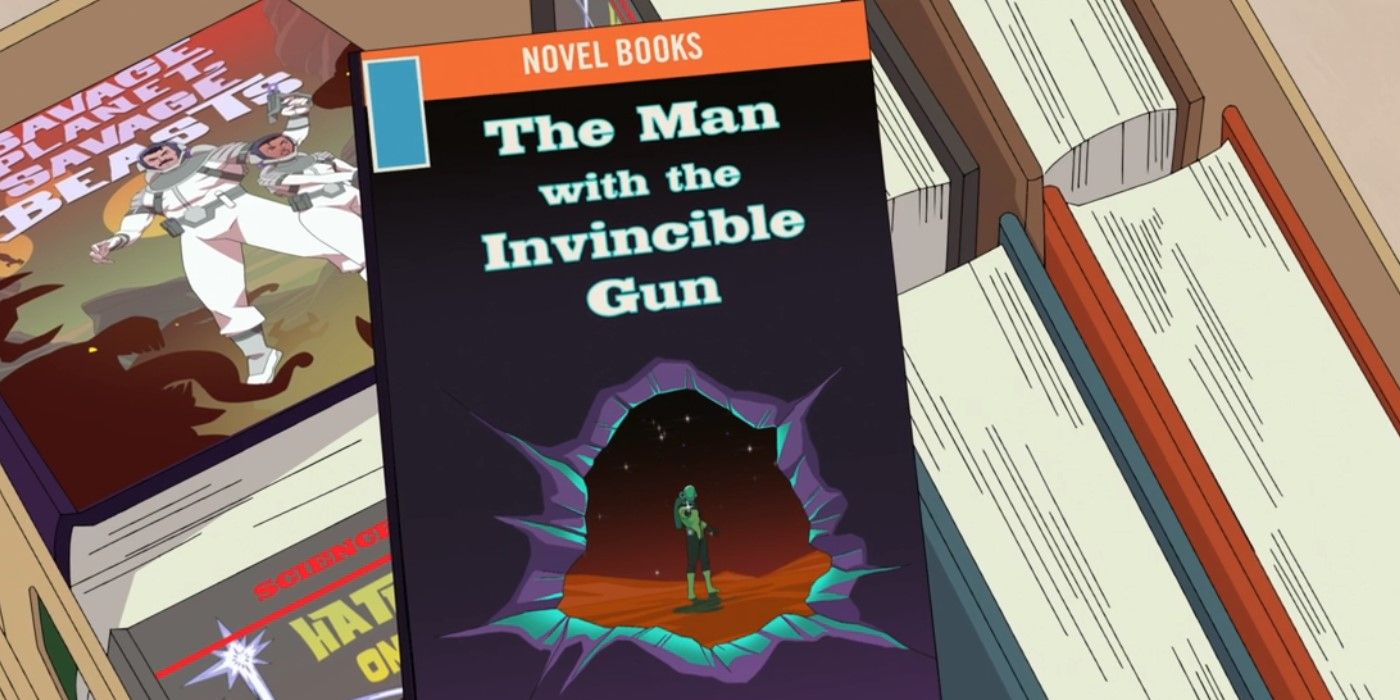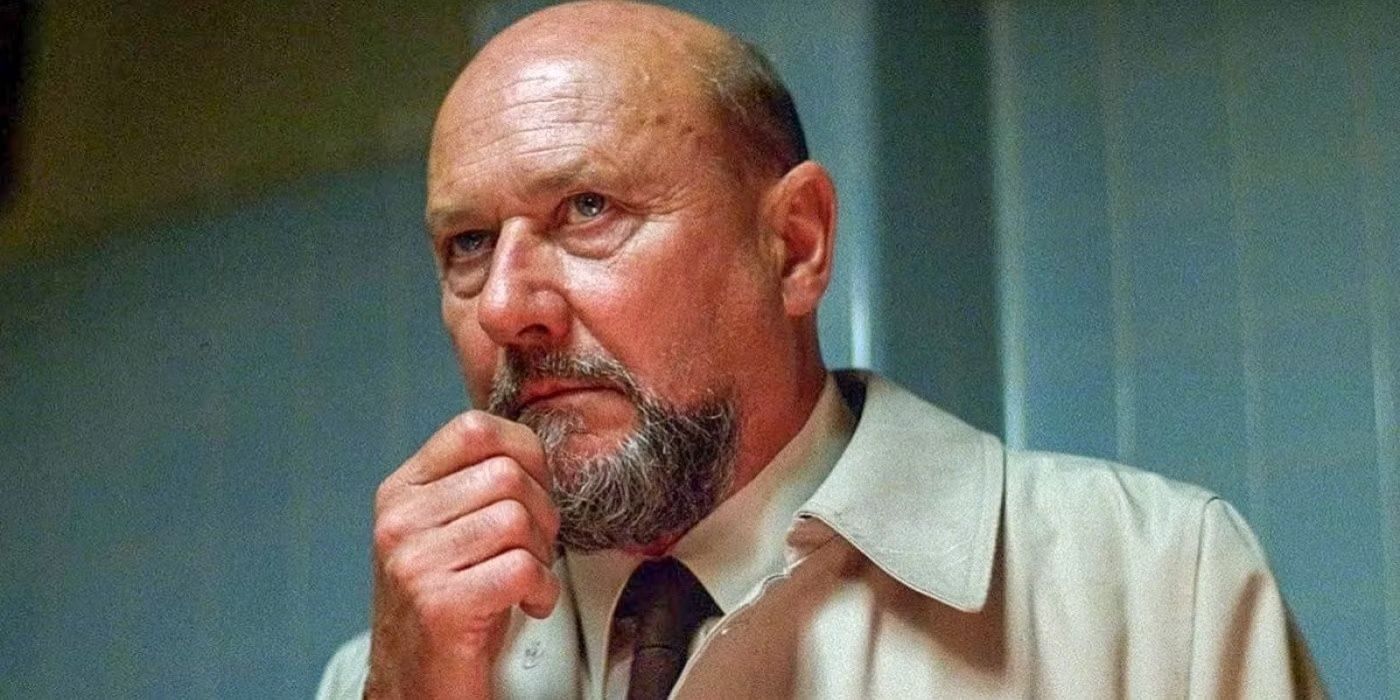The Big Picture
- “Prophecy Girl” is the first truly great episode of Buffy the Vampire Slayer, establishing higher stakes and foreshadowing the show’s later seasons.
- The emotional impact of Buffy’s impending death and her struggle with destiny is a standout moment in the first season.
- The episode’s significant events, such as Buffy’s death and subsequent resurrection, have lasting effects on the show’s narrative and future character arcs.
Buffy the Vampire Slayer is a TV show that’s up there with the greatest of all time, but you wouldn’t exactly know it from watching much of its first season. The show is an acclaimed fusion of just about every genre there is, being broadly definable as a “drama,” but also offering plenty by way of action, romance, comedy, horror, and fantasy throughout its seven seasons, totaling nearly 150 episodes. The titular character, Buffy Summers (Sarah Michelle Gellar), is introduced as a teenage girl attending a new school in the seemingly peaceful town of Sunnydale. As is made clear straight away, Sunnydale has an incredibly inaccurate name, as it’s actually populated with vampires and demons thanks to it being built on top of a Hellmouth, a literal portal to horrible alternate dimensions. Season 1 is rough-going at times, but it does at least introduce the show’s location, its unique blend of genres, and its core cast of endearing characters while managing to conclude on a high with its season finale, “Prophecy Girl.”
“Prophecy Girl” is the twelfth episode of the show overall, and it’s easy to argue that it’s Buffy the Vampire Slayer’s first truly great hour. Plenty of episodes throughout the show’s seven seasons did a great job of shaking up the status quo, but given how “Prophecy Girl” shook it up first, it deserves an extra level of admiration. Not only does it successfully wrap up plenty of story beats established throughout Season 1, but it also gives viewers the most emotional episode contained within Buffy‘s first season, establishes higher stakes than had ever been present before, and hints at things to come throughout the show’s later (and largely excellent) seasons. “Prophecy Girl” changed Buffy for the better, and also altered how people viewed the entire show going forward, helping – by the end of its first season — to establish Buffy the Vampire Slayer as a vampire-centered show that could rival some of the best vampire books/movies/shows ever made.
Buffy The Vampire Slayer
A young woman, destined to slay vampires, demons and other infernal creatures, deals with her life fighting evil, with the help of her friends.
- Release Date
- March 10, 1997
- Cast
- Sarah Michelle Gellar, Alyson Hannigan, Nicholas Brendon, Michelle Trachtenberg, Emma Caulfield, James Marsters
- Main Genre
- Action
- Seasons
- 7
- Creator
- Joss Whedon
“Prophecy Girl” Concludes Season 1 of ‘Buffy the Vampire Slayer’ With a Bang
With just 12 episodes and what looks to be a fairly low budget, Season 1 of Buffy the Vampire Slayer is hardly representative of the show at its best. Oddly enough, it’s somehow one of the highest rated according to Rotten Tomatoes, but it’s unlikely many fans would say Season 1 overshadows some of the highlights of Buffy’s later years. Still, at least Season 1 does do some things well right out of the gate, including having an overarching villain called the Master (Mark Metcalf) who’s lurking in the shadows throughout the first dozen episodes, gradually building strength and enacting his master plan (yes, terrible pun intended). The idea of having one “big bad” per season began here, and though the Master isn’t quite the show’s finest main antagonist, he walked so that all the other compelling villains from later seasons could run… and quip, threaten, kill, etc.
Clearly, then, “Prophecy Girl” is all about Buffy’s showdown with the Master, which had been 12 episodes in the making. As had been hinted at earlier in the season, though, the two are linked by a terrible prophecy which is revealed to Buffy in the episode’s most powerful scene. She overhears her mentor/Watcher, Giles (Anthony Stewart Head) telling a pre-Angel Angel (David Boreanaz) about the titular prophecy, which is essentially that Buffy is destined to face the Master and die in the process. Her emotional reaction, and desire to somehow quit her destiny as the Slayer, is the most moving scene of the entire first season, as the idea that she’s going to die hits home. Before this, fighting supernatural foes in Sunnydale had been relatively smooth sailing, with there never being a true sense that any main character was actually in danger. But then “Prophecy Girl” comes along and says that the hero of the show has to die. Furthermore, a few scenes later, she actually does.
“Prophecy Girl” Is an Emotional Peak in ‘Buffy’s Early Years
Granted, this is a fantasy show and there were still six more seasons left after this, so the death of the titular character is but a hiccup in the overall scheme of things. Viewers watching today will know this for sure, and there’s a good chance viewers in 1997 weren’t worried it would stick, either. But it’s not so much the death itself but the way it sinks in for Buffy that proves truly moving and surprising in a way Season 1 hadn’t been up until that point, with its closest episode quality-wise probably being “Angel.” At this stage in the show, Buffy’s mother, Joyce (Kristine Sutherland) is still unaware her daughter is the Slayer and believes Buffy’s emotional troubles stem from an upcoming school prom. She tries to comfort Buffy as well as she can, telling her about her own experiences with going to prom, and how the night started terribly but ended up being great. At the end of Joyce’s story about her prom night, Buffy, without being able to come clean about her looming death, says: “And you had your whole life ahead of you. Must be nice.”
It’s heartbreaking stuff, as is the aforementioned scene where Buffy tries to fight the idea of destiny, breaking down in the library after overhearing Giles and Angel. Sarah Michelle Gellar had been good in the earlier episodes of Buffy, but “Prophecy Girl” is the first episode that truly let her demonstrate what a great actress she is, with her telling Giles, “I’m 16 years old. I don’t wanna die.” It’s a hard-hitting statement, and one that stands in stark contrast to the campier tone prevalent throughout much of Season 1. She finds as much solace as she can with friends and family before setting off alone to fulfill the prophecy, rising to the occasion and demonstrating a level of strength she hadn’t needed to demonstrate up until this point in the show.
Death Becomes (Temporarily) Real in “Prophecy Girl”
For better or worse, Buffy the Vampire Slayer eventually earned a reputation as a show that was willing to kill off main characters tragically and suddenly, most notably in the show’s controversial sixth season. It was never as bloodthirsty as something like The Walking Dead or Game of Thrones, but those outside Buffy’s immediate friend group tended to feel at risk of getting killed off in just about any episode, and even the core cast wasn’t entirely safe during particularly dramatic and tragic episodes. Some like the added drama this gives Buffy the Vampire Slayer while others accuse the show of indulging in some instances of fridging, but in any event, the precedent for Buffy being this kind of show was established in “Prophecy Girl,” thanks to the main character herself dying… even if only for a few minutes.
Viewers might be savvy, but the characters aren’t, and the titular character reckoning with her inevitable demise is powerful stuff either way. Similarly, Angel and Xander (Nicholas Brendon) have to reckon with the fact she may be dead forever, until the latter performs CPR and brings her back to life, seemingly more powerful than even after the Master took her life (but didn’t take enough, apparently). When Buffy comes back to life, the emotions swing like a pendulum, and Season 1’s most harrowing episode then transforms into its most triumphant. The theme music kicks in as Buffy walks purposefully toward the Master once more, determined to put a halt to his short-lived plans to do a Tears for Fears and rule the world. Emotional highs are most striking when they follow emotional lows, and “Prophecy Girl” is the first episode of Buffy the Vampire Slayer to soar in this regard.
“Prophecy Girl” Was Prophetic for ‘Buffy the Vampire Slayer’
While some might argue the very best episodes of Buffy the Vampire Slayer are even better than “Prophecy Girl” (and such an argument’s not unfair), “Prophecy Girl” did still bravely establish what a great episode of Buffy should look and sound like, as well as feel like to watch. It’s a more streamlined emotional rollercoaster than anything that had come before, and in that way, it foreshadows many of the show’s finest hours to come. Further, it also feels prophetic in a more literal sense, given the implications of Buffy’s death have ramifications on a strictly narrative level going forward. Without Buffy dying, there’s no second Slayer (Kendra, played by Bianca Lawson) being introduced in Season 2. Then, without Kendra’s untimely demise, there’s no Faith (Eliza Dushku) getting introduced as another Slayer, with her being one of the show’s strongest and most interesting characters overall.
It’s clear, then, that there are many ways the impactful moments of “Prophecy Girl” ripple out and ultimately change the entire show for the better. It’s the most dramatic and powerful episode of Season 1, and it established new emotional highs for the show to explore in later seasons while also wrapping up Season 1 in a satisfying way. The stakes were raised, allowing later seasons to become more suspenseful and moving, particularly when it came to the subject of character deaths, and some of the plot elements impacted later character arcs and stories within subsequent seasons of Buffy the Vampire Slayer. While Season 1 of Buffy might not be particularly amazing, the finale that wraps the whole thing up — “Prophecy Girl” — is genuinely great overall and is a vitally important episode in the show’s history that changed both how the show functioned and how it was viewed going forward by those willing to give its otherwise fairly silly first season a chance.
Buffy the Vampire Slayer can be streamed on Hulu in the U.S.
Watch on Hulu





